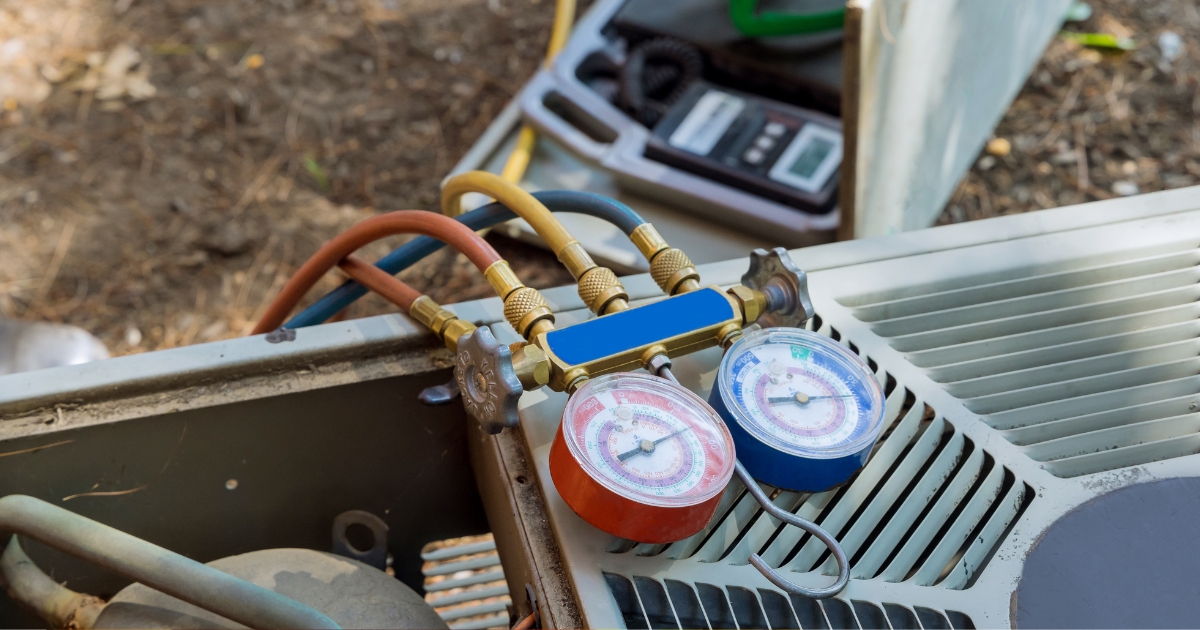Keeping Your Home’s Air Clean and Comfortable
Family safe home heating and air systems are essential for ensuring that your indoor environment is not only comfortable but also promotes good health. When you think about the amount of time you and your family spend indoors, it’s clear that having a clean, energy-efficient heating and cooling system is key to maintaining both comfort and well-being.
Key Benefits of a Healthy HVAC System:
- Improved Air Quality – Reduces allergens, dust, and pollutants.
- Energy Efficiency – Lowers energy bills and reduces carbon footprint.
- Improved Comfort – Provides consistent indoor temperatures.
- Cost Savings – Decreases repair costs and extends the lifespan of your system.
A well-maintained HVAC system does more than just regulate temperature. It plays a crucial role in filtering out contaminants and maintaining the air quality that affects your health.
According to the Department of Energy,
44 percent of a home’s energy costs come from heating and cooling systems. So, if your heating and cooling systems are efficient, you can save significantly on energy bills while enjoying a more comfortable living space.
We’ll dive deeper into how you can achieve a healthy home heating and air system, discussing different types of systems, maintenance tips, and how to choose the right one for your home in the following sections. Stay tuned to make informed decisions that improve both your home’s comfort and efficiency.
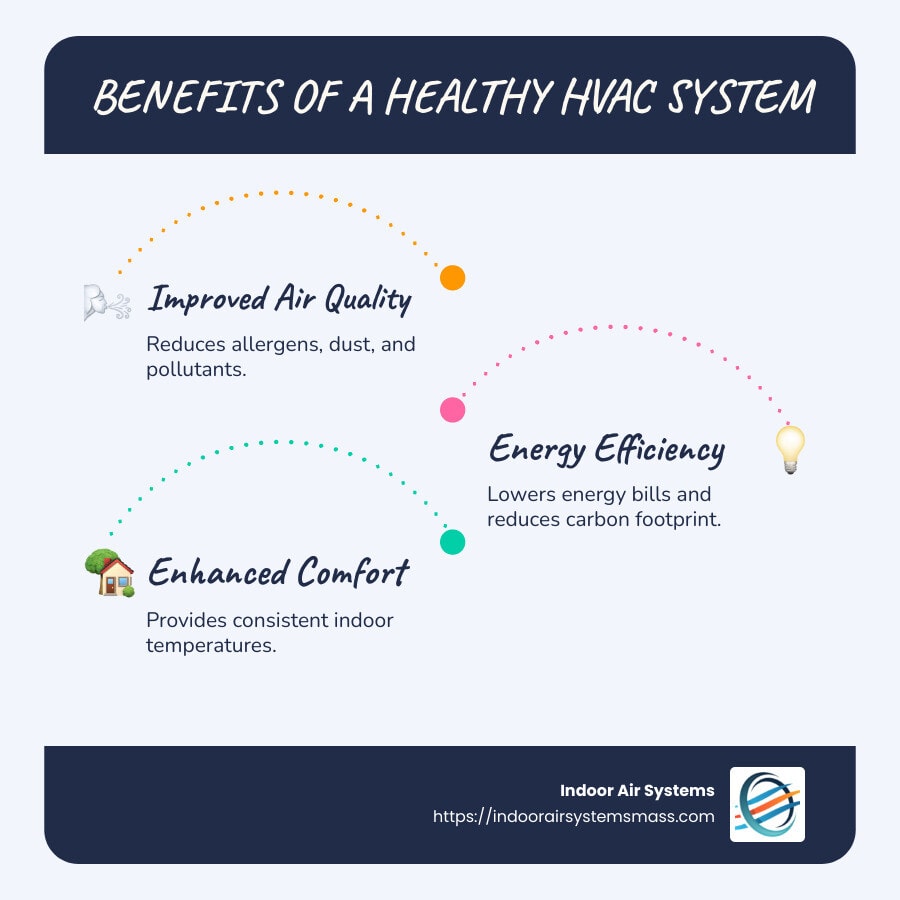
Table of Contents
Understanding Healthy Home Heating and Air Systems
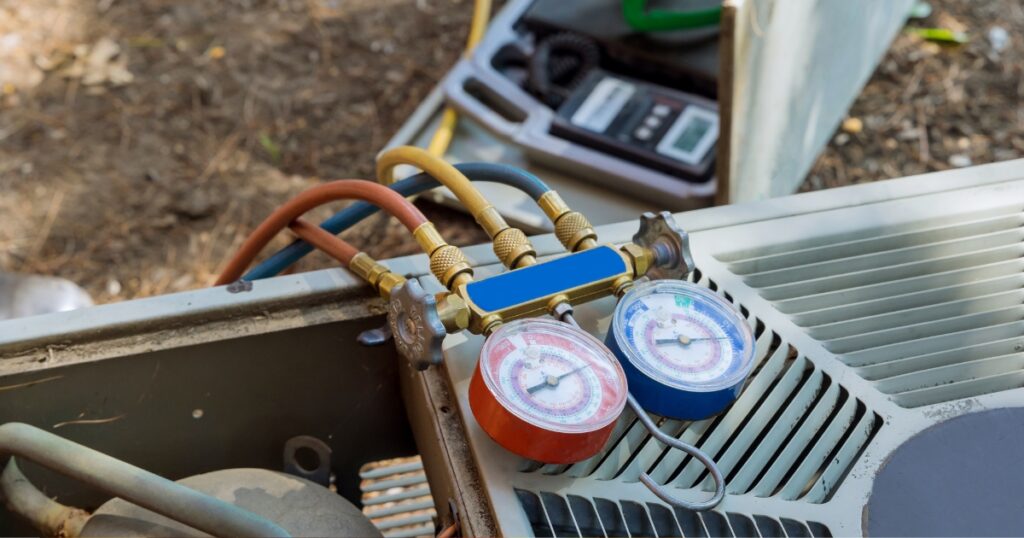
What is HVAC?
HVAC stands for Heating, Ventilation, and Air Conditioning. These systems are designed to keep your home comfortable year-round by regulating temperature and maintaining indoor air quality.
Components of HVAC Systems:
- Heating Unit: This could be a furnace, boiler, or heat pump. It warms the air during colder months.
- Ventilation: This involves air ducts and fans that circulate air throughout your home, ensuring fresh air replaces stale air.
- Air Conditioning: It cools the air during warmer months, often using the same ductwork as the heating system.
Importance of Air Quality
Air quality is crucial for a healthy home. Poor air quality can lead to health issues like allergies, asthma, and other respiratory problems.
Common Indoor Contaminants:
- Allergens: Dust, pollen, and pet dander can trigger allergies.
- Pollutants: Chemicals from cleaning products and building materials can harm your health.
- Mold: Moist environments can lead to mold growth, which can cause health issues.
A well-maintained HVAC system can filter out these contaminants, ensuring cleaner, healthier air in your home.
Energy Efficiency in HVAC Systems
Energy efficiency is not just about saving money on your energy bills; it’s also about reducing your carbon footprint. According to the Department of Energy, 44 percent of a home’s energy costs come from heating and cooling systems. Efficient systems can significantly lower these costs.
Eco-Friendly Options:
- Heat Pumps: These systems transfer heat rather than generate it, making them highly efficient. They can be used for both heating and cooling.
- Ductless Mini Splits: Ideal for homes without existing ductwork, these systems offer high efficiency and flexibility.
- Insulation and Air Sealing: Proper insulation and sealing can reduce the load on your HVAC system, improving its efficiency. Other options like attic insulation upgrades and air sealing can significantly enhance home efficiency and comfort.
Cost Benefits:
- Lower Energy Bills: Efficient systems use less energy, reducing your monthly bills.
- Reduced Maintenance Costs: Well-maintained systems last longer and require fewer repairs.
- Increased Home Value: Energy-efficient homes are more attractive to buyers, potentially increasing your home’s value.
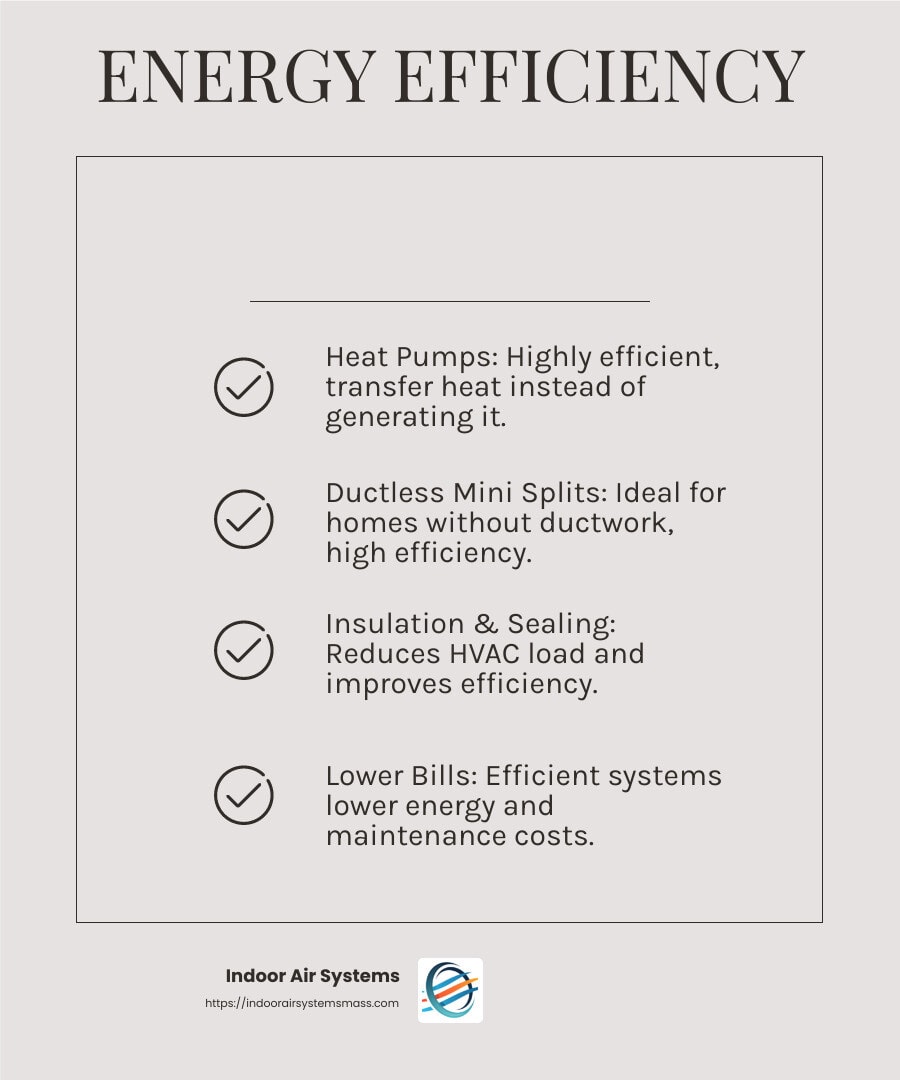
By understanding the basics of HVAC systems, the importance of air quality, and the benefits of energy efficiency, you can make informed decisions about your home’s heating and cooling needs. Up next, we’ll explore different types of healthy home heating systems and how they can benefit you.
Types of Healthy Home Heating Systems
Hydronic Heating
Hydronic heating systems use water to transfer heat throughout your home. Instead of blowing warm air, these systems circulate hot water through pipes installed in floors, walls, or radiators. This method offers several benefits:
- No Allergens: Unlike forced air systems, hydronic heating doesn’t blow dust, pollen, or other allergens around your home. This makes it an excellent choice for people with allergies or asthma.
- No Ductwork: These systems don’t require ducts, which can harbor dust and mold. This simplifies installation and maintenance.
- Comfort: Hydronic systems provide even, consistent heat. You won’t experience the hot and cold spots that are common with forced air systems.
Heat Pumps
Heat pumps are versatile systems that can both heat and cool your home. They work by transferring heat from one place to another, rather than generating it. There are two main types of heat pumps:
- Geothermal Heat Pumps: These systems use the stable temperature of the ground to transfer heat. They are highly efficient and can reduce energy consumption by up to 50% compared to traditional heating systems.
- Air Source Heat Pumps: These systems transfer heat between your home and the outside air. They are easier to install than geothermal systems and are ideal for moderate climates.
Cooling Efficiency: Heat pumps are also very efficient for cooling. They can reduce energy use by 20-40% compared to traditional air conditioners.
Furnaces
Furnaces are one of the most common heating systems in homes. They can be powered by various energy sources:
- Natural Gas: This is a popular and cost-effective option. Gas furnaces are efficient and can quickly heat your home.
- Propane: Propane furnaces are similar to natural gas furnaces but are used in areas where natural gas is not available. They are also efficient and reliable.
- Oil: Oil furnaces are less common but are still used in some areas. They are typically more expensive to operate than gas or propane furnaces.
Each type of furnace has its benefits and drawbacks, but they all provide reliable, consistent heat.
By understanding the different types of heating systems—hydronic heating, heat pumps, and furnaces—you can choose the best option for your home. Each system offers unique benefits, from improved air quality to energy efficiency, ensuring a healthy home heating and air environment.
Cooling System Considerations
When it comes to choosing a cooling system for your home, several factors come into play to ensure you achieve the perfect balance of comfort, efficiency, and cost-effectiveness. One of the most critical considerations is the size of the system.
A cooling system that is too small may struggle to cool your home effectively, leading to discomfort and overworking the unit. Conversely, a system that is too large can cycle on and off too frequently, wasting energy and driving up your utility bills.
Another key factor is the type of cooling system that best suits your needs. For instance, if you live in a hot and humid climate, you might want to consider a system specifically designed to handle high humidity levels, such as a central air conditioning system with a built-in dehumidifier. Alternatively, ductless mini-split systems offer flexibility and efficiency, especially in homes without existing ductwork.
Energy efficiency is another crucial consideration. Look for a cooling system with a high SEER (Seasonal Energy Efficiency Ratio) rating. A higher SEER rating indicates a more energy-efficient system, which can lead to significant savings on your utility bills over time.
Additionally, consider the maintenance requirements of the system. Some systems may require more frequent maintenance than others, so it’s essential to factor this into your decision to ensure long-term efficiency and performance.
By carefully considering these factors—size, type, energy efficiency, and maintenance—you can select a cooling system that keeps your home comfortable while optimizing energy use and minimizing costs.
Maintenance Tips for a Healthy HVAC System
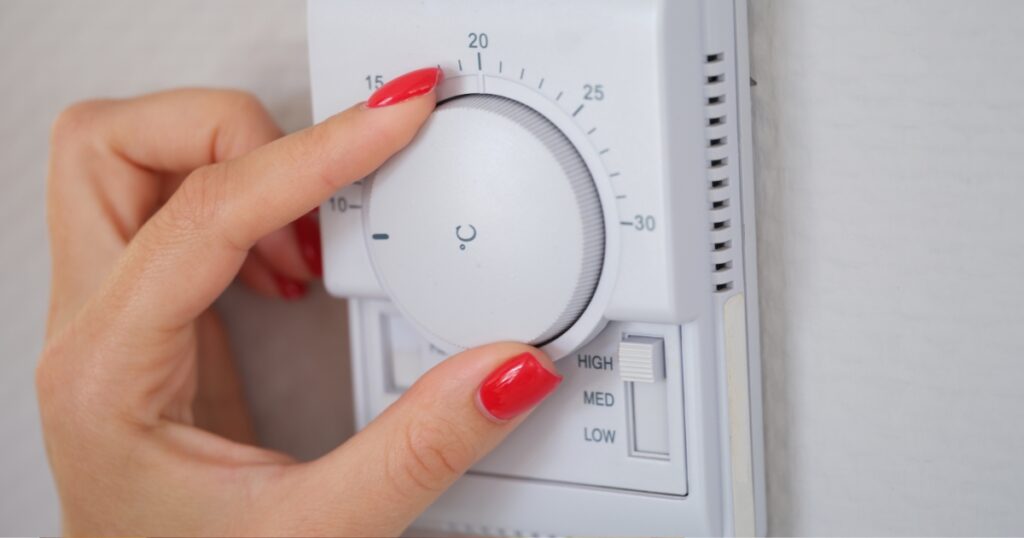
Keeping your HVAC system in good shape is crucial for maintaining a healthy home heating and air environment. Here are some essential maintenance tips to ensure your system runs efficiently and safely.
Annual Boiler Service
Annual boiler service is vital for the health and longevity of your heating system. Regular servicing ensures your boiler operates safely and efficiently. Here are some key benefits:
- Safety: Regular inspections can catch potential hazards like gas leaks or carbon monoxide emissions.
- Efficiency: A well-maintained boiler operates more efficiently, saving you money on energy bills.
- Longevity: Routine maintenance can extend the life of your boiler, delaying the need for costly replacements.
Regular System Checks
Performing regular system checks can prevent small issues from becoming major problems. Here’s what you should focus on:
- Pressure Checks: Ensure your system maintains the correct pressure. Low pressure can reduce efficiency, while high pressure can cause damage.
- Radiator Bleeding: Bleed your radiators to remove trapped air, which can cause uneven heating.
- Warning Signs: Look out for unusual noises, leaks, or inconsistent heating. These can be early signs of a problem.
Insulating Pipes
Insulating your pipes can lead to significant energy savings and prevent heat loss. Here’s why it’s important:
- Energy Savings: Insulated pipes retain heat better, reducing the workload on your heating system. This leads to lower energy bills.
- Preventing Heat Loss: Proper insulation ensures that the heat generated by your system is efficiently distributed throughout your home.
- Cost Efficiency: Insulating pipes is a cost-effective way to improve your system’s efficiency without major upgrades.
By following these maintenance tips, you can ensure your HVAC system remains efficient, safe, and effective. Regular upkeep not only improves the performance of your heating and cooling system but also contributes to a healthier home environment.
Next, we’ll explore how to choose the right HVAC system for your home.
Upgrading and Retrofitting
If you’re looking to enhance the performance of your existing cooling system, upgrading or retrofitting can be a smart and cost-effective solution. One popular option is to upgrade to a more energy-efficient system, such as a heat pump or a ductless mini-split system.
These systems not only provide significant energy savings but may also qualify for rebates or incentives, making them an attractive choice for homeowners looking to reduce their energy footprint.
Retrofitting your current system with new components is another viable option. For example, installing a high-efficiency air conditioner or a programmable thermostat can improve your system’s efficiency and performance without the need for a complete replacement. These upgrades can help you achieve better temperature control and lower energy consumption.
It’s also essential to consider the condition of your duct system when upgrading or retrofitting your cooling system. Leaky or poorly insulated ducts can significantly reduce the efficiency of your system, leading to higher energy bills and uneven cooling. Sealing and insulating your ducts can enhance the performance of your cooling system, ensuring that conditioned air is distributed efficiently throughout your home.
By exploring these options, you can improve the efficiency and effectiveness of your cooling system, leading to a more comfortable and energy-efficient home environment.
Choosing the Right HVAC System for Your Home
Selecting the right HVAC system is crucial for maintaining a healthy home heating and air environment. Here are some factors to consider, comparisons between different systems, and professional advice to help you make the best choice.
Factors to Consider
When choosing an HVAC system, several factors should guide your decision:
- Home Size: Larger homes may require more powerful systems or multiple units to ensure even heating and cooling.
- Climate: Your local climate heavily influences the type of system you need. For example, heat pumps are excellent for moderate climates, while furnaces are better suited for colder regions.
- Budget: Initial costs, maintenance expenses, and energy efficiency should all be considered to ensure you get the best value.
System Comparisons
Understanding the differences between various HVAC systems can help you choose the one that best fits your needs.
Heat Pumps vs. Furnaces
- Heat Pumps: These systems are highly efficient and versatile, providing both heating and cooling. They are ideal for moderate climates and can significantly reduce energy costs. Heat pumps work by transferring heat rather than generating it, making them eco-friendly.
- Furnaces: Furnaces are powerful and reliable, especially in colder climates. They use natural gas, propane, or oil to generate heat. While they can be more expensive to operate than heat pumps, their ability to quickly heat a home makes them a popular choice.
Hydronic vs. Forced Air
- Hydronic Heating: This system uses water to transfer heat through radiators or underfloor piping. It’s known for providing even, comfortable heat without circulating dust or allergens, making it a healthier option for those with respiratory issues.
- Forced Air: This system heats air and distributes it through ducts. It’s quick to heat and cost-effective, especially if your home already has ductwork. However, it can circulate dust and allergens, requiring regular maintenance to ensure good air quality.
Professional Advice
Consulting with a professional can provide valuable insights and help you make an informed decision.
- Consultation: A professional can assess your home’s specific needs, considering factors like insulation, window efficiency, and existing ductwork.
- Free Estimates: Many companies offer free estimates, allowing you to compare options without financial commitment. This can help you understand the potential costs and benefits of different systems.
- Second Opinions: Don’t hesitate to seek a second opinion to ensure you’re getting the best advice. Different experts may have varying recommendations based on their experience and perspective.
By considering these factors, comparing different systems, and seeking professional advice, you can choose the right HVAC system to create a healthy home heating and air environment.
Importance of Professional Installation
When it comes to installing a new cooling system, the importance of professional installation cannot be overstated. A professional installer ensures that your system is installed correctly and safely, adhering to all local building codes and regulations. This not only guarantees optimal performance but also protects your investment.
A professional installer can help you choose the right system for your home, ensuring it is appropriately sized for your space. Proper sizing is crucial for efficient operation; an undersized system will struggle to cool your home, while an oversized system will waste energy. Additionally, a professional can provide valuable information on maintaining and troubleshooting your system, helping to extend its lifespan and reduce energy costs.
Moreover, professional installation often comes with a warranty on both the work and the system itself. This warranty provides peace of mind, knowing that you are protected in case anything goes wrong. By hiring a professional, you ensure that your cooling system is set up for success, providing reliable and efficient cooling for years to come.
Common Issues and Troubleshooting
Cooling systems, like any other home appliance, can encounter issues that affect their performance. Being aware of common problems and knowing how to troubleshoot them can help you maintain an efficient and effective cooling system.
One common issue is refrigerant leaks, which can cause your system to lose its cooling power. If you suspect a refrigerant leak, it’s crucial to turn off the system and contact a professional installer to repair it. Operating a system with low refrigerant can lead to further damage and decreased efficiency.
Another frequent problem is a clogged air filter. A dirty air filter can restrict airflow, reducing the efficiency of your cooling system and increasing your energy bills. Regularly replacing or cleaning your air filter is a simple yet effective way to maintain good air quality and system performance.
Electrical problems can also arise with cooling systems. If your system is not turning on or is not cooling your home effectively, check the circuit breaker or fuse box to ensure the system is receiving power. If the issue persists, it’s best to contact a professional installer to diagnose and repair the problem.
By staying vigilant and addressing these common issues promptly, you can ensure that your cooling system runs efficiently and effectively, keeping your home cool and comfortable throughout the summer months.
Conclusion
Maintaining a healthy home heating and air system is crucial for your comfort, energy savings, and overall well-being. From choosing the right heating system to regular maintenance, every step plays a significant role in ensuring your home remains a sanctuary of comfort and health.
About Indoor Air Systems
Contact us today at Indoor Air Systems, we understand the importance of a well-functioning HVAC system. Based in Central Massachusetts, we specialize in residential heating and cooling services with a focus on mini-split systems.
Our over 20 years of experience enable us to provide personalized attention and responsive service without the high overhead costs associated with larger companies. We are also proud to be actively involved in the Indian Trail community, supporting local events and services.
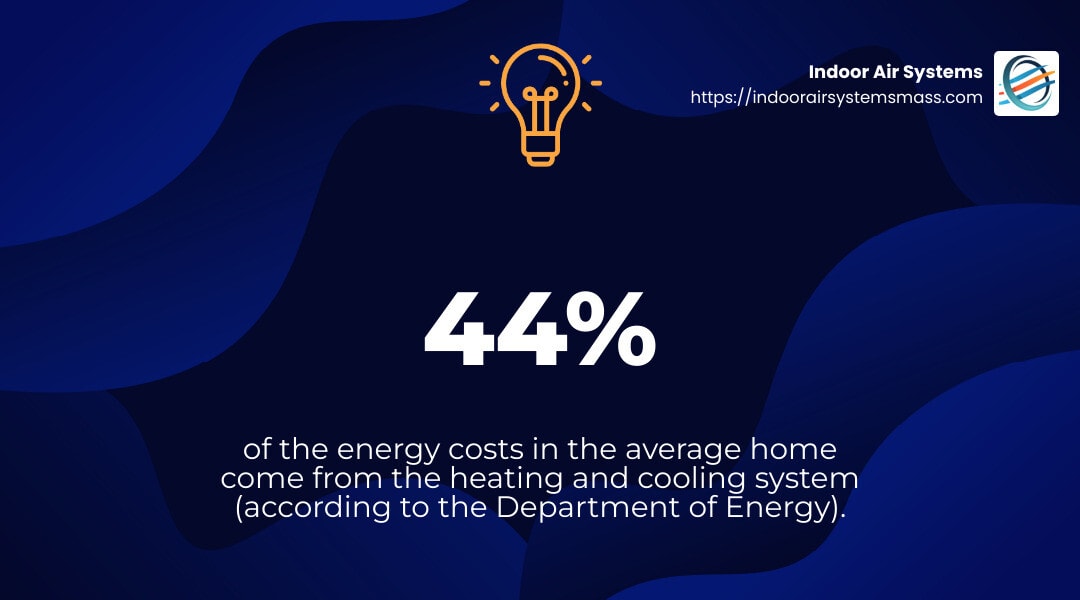
Our commitment to your home’s health and comfort means we offer custom solutions to meet your specific needs. Whether it’s installing a new system or maintaining an existing one, our team is dedicated to providing the highest quality service.
Choosing Indoor Air Systems means choosing a partner who cares about your comfort as much as you do. We offer expert advice, free estimates, and second opinions to ensure you make the best decisions for your home.
For more information on our services, visit our services page and take the first step towards a healthier, more comfortable home.
Thank you for considering Indoor Air Systems for your HVAC needs. We look forward to helping you create a healthier, more comfortable living environment.
Frequently Asked Questions about Healthy Home Heating and Air
What is the healthiest home heating system?
Choosing the healthiest home heating system depends on your specific needs and circumstances. However, three main types stand out:
- Hydronic Heating: Uses water to distribute heat through radiators or underfloor pipes. It provides even, comfortable heat without stirring up dust or allergens, making it ideal for those with respiratory issues.
- Heat Pumps: These are highly efficient and versatile, offering both heating and cooling. They work by transferring heat rather than generating it, which makes them eco-friendly and cost-effective. Heat pumps can be ducted or ductless, fitting various home designs.
- Furnaces: Traditional but powerful, furnaces use natural gas, propane, or oil to generate heat. While they can be more expensive to operate, their ability to quickly and effectively heat a home is best, especially in colder climates.
How can I maintain a healthy HVAC system?
Maintaining a healthy HVAC system involves regular upkeep and some preventive measures:
- Annual Boiler Service: Regular servicing keeps your boiler running efficiently and safely. It helps identify potential issues before they become major problems.
- Regular System Checks: This includes checking pressures, bleeding radiators, and inspecting for any warning signs like unusual noises or decreased performance. Regular checks ensure your system operates smoothly and efficiently.
- Insulating Pipes: Proper insulation prevents heat loss, saving energy and reducing costs. It also helps in maintaining consistent temperatures and protecting against pipe damage in cold weather.
- Air Filters: Replace or clean air filters regularly to maintain good air quality and efficient airflow. Dirty filters can circulate dust and allergens, affecting indoor air quality.
What are the signs of an unhealthy HVAC system?
An unhealthy HVAC system can manifest through various signs:
- Mold Growth: Visible mold around vents or a musty smell can indicate moisture issues within the system. Mold can severely impact indoor air quality and cause health problems.
- Respiratory Issues: Frequent respiratory problems, allergies, or asthma attacks among household members may suggest poor air quality due to a malfunctioning HVAC system.
- Frequent Doctor Visits: If you notice an increase in respiratory-related doctor visits, it might be worth checking your HVAC system for issues.
- Unusual Noises: Strange noises like banging, clanking, or hissing can indicate mechanical problems that need immediate attention.
- Inconsistent Temperatures: Uneven heating or cooling across rooms suggests your system may not be functioning properly, leading to discomfort and higher energy bills.
Maintaining a healthy home heating and air system is essential for your comfort and well-being. Regular maintenance and being aware of warning signs can help you keep your HVAC system in top shape.
Our Content
At Indoor Air Systems, LLC, we provide specialized HVAC services with a personal touch. Serving Central Massachusetts, we focus on the installation and maintenance of mini-split systems, split system air conditioner, heating and cooling system, heating air, ensuring efficient and cost-effective heating and cooling solutions. Our locally owned and operated business allows us to offer exceptional customer attention and responsiveness without the high costs associated with larger companies. Choose Indoor Air Systems for reliable, expert service tailored to your specific needs.

